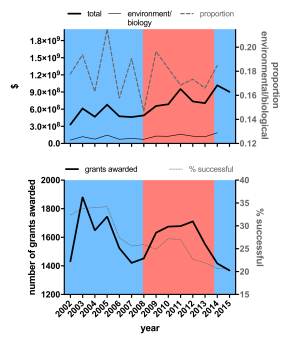 Within six months of Abbott and the Coalition seizing power in the 2013 Australian election, decades—if not centuries—of environmental damage and retrograde policies unfolded. But this was no run-of-the-mill incompetence and neglect by government—this was an all-out attack on anything with the merest whiff of environmental protection. The travesty is well-documented, from infamously axing both the carbon-pricing scheme and climate commission, eradicating Labor’s 80% emissions-reduction target by 2050, diluting the Renewable Energy Target, refusing to commit to enforcing the Illegal Logging Prohibition Act (fortunately, this is now law), defunding the only independent legal entity available to limit environmentally destructive development (Environmental Defenders Office), to even attempting to remove the rights of environmental groups to challenge development proposals (thankfully, that failed).
Within six months of Abbott and the Coalition seizing power in the 2013 Australian election, decades—if not centuries—of environmental damage and retrograde policies unfolded. But this was no run-of-the-mill incompetence and neglect by government—this was an all-out attack on anything with the merest whiff of environmental protection. The travesty is well-documented, from infamously axing both the carbon-pricing scheme and climate commission, eradicating Labor’s 80% emissions-reduction target by 2050, diluting the Renewable Energy Target, refusing to commit to enforcing the Illegal Logging Prohibition Act (fortunately, this is now law), defunding the only independent legal entity available to limit environmentally destructive development (Environmental Defenders Office), to even attempting to remove the rights of environmental groups to challenge development proposals (thankfully, that failed).
The Coalition’s backward and ineffectual climate change-mitigation policies alone are evidence enough for long-term damage, but their war on the environment in general means that even the future election of a more environmentally responsible government will not undo the damage quickly, if at all. As a result of these and other nearsighted policies, Australia remains one of the highest per-capita greenhouse-gas emitters on the planet, has one of the highest per-capita water uses of any nation, leads the world in mammal extinctions, continues to deforest its already forest-poor landscape, and is a society utterly unprepared to deal with the future challenges of a degraded planet.
When Abbott was spilled from the leadership in September 2015, most in the ecology and environment community breathed a little sigh of relief, for the replacement leader Malcolm Turnbull appeared to be at least a little less hostile to the environment. Sadly, either as a result of a powerful right-wing arm of his own and affiliated parties, his own lack of commitment and priority, or just outright incompetence, nothing really changed for the better in Australia’s environment policies. In fact, Turnbull more or less continued with the Abbott legacy and failed utterly to overturn Abbott’s damaging policies. This is best described by the woeful profile performance of Abbott’s (and Turnbull’s) Environment Minister, Greg Hunt. If we were to grade Hunt on the classic academic scale, he would struggle to receive anything higher than a D- for his time in office.
Earlier this month, the Coalition narrowly won the 2016 election, followed by a prompt Cabinet reshuffle and the replacement of several ministers, including Greg Hunt. Hunt is now off to try his luck at managing our country’s Industry, Innovation and Science portfolio, with Josh Frydenberg taking the helm of the newly created ministry that now includes both environment and energy portfolios. If we were disappointed with Hunt’s performance, we should all be terrified of the prospect of Frydenberg being in charge of climate change and environment policies. Frydenberg has a long history of being ‘friendly’ to the coal-mining industry, even dubbed ‘Mr Coal’ by right-wing pundits. He was the one responsible for championing the approval of the infamous Adani coal mine application, and he regularly repeats the disproven claim that fossil fuels “… lift people out of energy poverty …”. I do not think that I am alone in fearing that the next wave of environmental neglect, climate-change inaction and future-eating is poised to begin.

Environmental concern typically results in a preponderance of bad news, and in the case of Australia’s recent politics, there is little prospect for environmental hope in the near future. As ecologists, we can continue to fight bad environmental policies with good evidence, but I also implore our membership to become more proactive and advocate on behalf of the environment we hold so dear.
CJA Bradshaw

